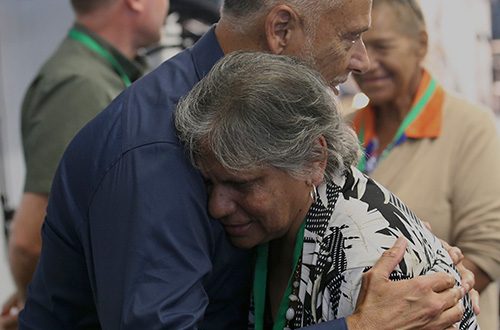The 37th Synod continued today, members making the late night or early morning pilgrimage north to Alexandra Park Conference Centre after Friday night’s opening celebrations and Moderator’s induction service. Themed “In the likeness of our Ancestors” today’s work has drawn on the wisdom of our church, faith tradition and First Nations culture and practices. After progressing through formal opening business, the meeting moved to a day filled with worship, community building and shared reflection.
Opening Worship
In today’s opening worship, Rev Bruce Moore began by inviting members to reflect on those who have shaped them. Asking the Synod to ponder their own journey to this Synod meeting, Bruce reminded us that “God wants you to be here, we are called together because in the Christian life we are not called to be solo pilots.” He went on to call the Synod to a rich experience of relationship and community this week, asking the Synod to bring a posture of surrender to God and mutual surrender to one another.
Yarning Circles
Saturday afternoon’s program provided the first opportunity for Synod members to gather in Yarning Circles. Drawing on First Nations wisdom and practice, Yarning Circles are being used in place of the regular small group program at the 37th Synod. Members are using the ancient practice to discuss, explore and discern together. The key question for Yarning Circles today? “What did you hear through 40 days of prayer in relation to our call to be renewed as a church?” Yarning Circles will continue throughout the Synod program, feeding insights into the broader community discernment process.
Norman and Mary Millar Lecture: Dr Stanley Grant
Dr Stanley Grant, journalist, author, philosopher, thinker and filmmaker, brought the 2023 Norman and Mary Millar Lecture. Dr Grant’s drew on the recent experience of the Voice referendum to explore themes of language, atonement, justice, and, critically, lament. He joined poet Oodgeroo Noonuccal in pondering the consequences of free will, or at least the consequences of our use of it. He gave expression to a raw and real spirituality ever present in his own life, and that most difficult question experienced in the darkest moments “does God care?”
Perhaps most powerfully, Dr Grant explored the notion of feeling God’s absence. “We only know love by its absence,” he observed, “and perhaps we only know God in God’s absence.” Dr Grant drew on the words of Christ in his most alone moment: “Eli, Eli, lema sabachthani?” (Matt 27:46), reminding us that even in the darkest moments, there is hope. Hope is what holds us, even in the darkness, even in the deepest lament. And lament, Dr Grant reminded us, is a powerful and necessary emotion that our modern world often rushes past, to its detriment.
In a Norman and Mary Millar Lecture worthy of the now 20-year history of the series, Dr Grant left the 37th Synod with permission to lament, permission to feel and express sadness, and with permission to grieve deeply the perception of God’s absence. He also left the Synod with the sense of deep joy that in these dark and difficult moments, hope in Christ remains.
The lecture drew to a close with a panel exploring many of the themes Dr Grant raised. Thanks to Rev Roberta Stanley, Kym Korbe, Kim Harrison, Rev Esteban Lievano, Rev Noah Kim and Dr Stanley Grant.
Tomorrow
The 37th Synod continues Sunday morning. Themed “Smaller, Greener Shoots”, day three includes the reception and response to formal reports, consideration of general proposals, ballots (including the potential confirmation of a new General Secretary) and the opportunity for the Synod to engage with both its own Plenty strategic journey and with the Act 2 team from the national Assembly. Yarning circles will continue, too, in a day that promises rich conversation and discernment.
[ngg src=”galleries” ids=”32″ display=”basic_thumbnail” thumbnail_crop=”0″ ngg_proofing_display=”0″] JourneyOnline
JourneyOnline







